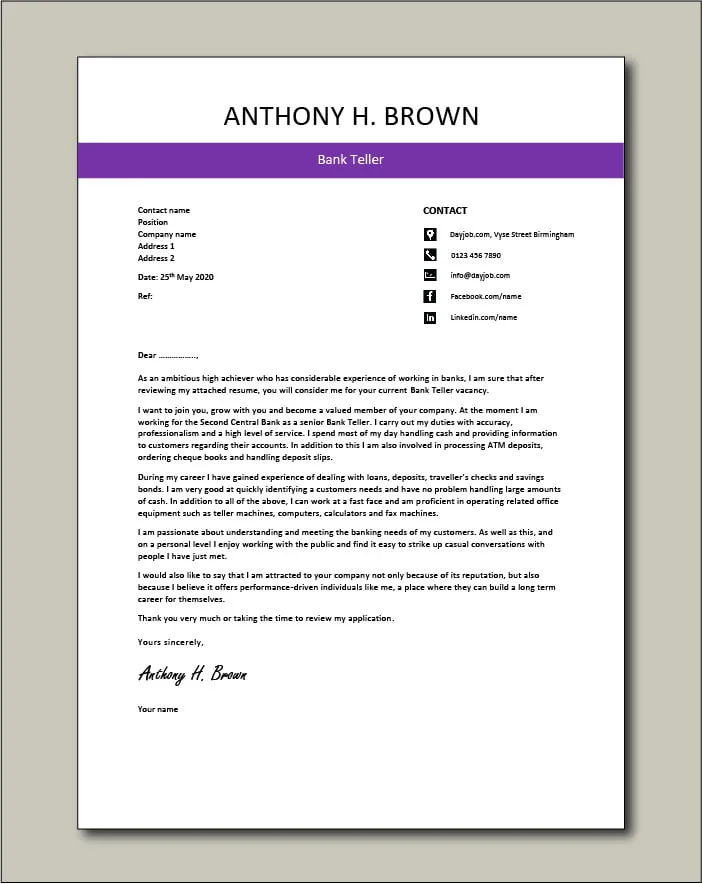Highlighting Your Strengths for Bank Teller Position
A compelling cover letter is your first opportunity to make a positive impression on a potential employer. For a bank teller position, it’s crucial to highlight skills and experiences directly relevant to the role. This section provides a guide on effectively showcasing your qualifications, emphasizing your strengths and illustrating why you’re the ideal candidate. Your cover letter should not just rehash your resume; it should elaborate on your abilities and demonstrate a clear understanding of the bank teller’s responsibilities. It’s about presenting yourself as a professional who possesses the necessary skills to excel in this customer-facing role and contribute to the bank’s success. Remember, a well-crafted cover letter is a powerful tool that can set you apart from other applicants and significantly increase your chances of landing an interview.
Banking Experience
If you have prior banking experience, be sure to emphasize it. Mention any roles you’ve held, the specific responsibilities you managed, and any accomplishments you achieved. This could include tasks such as processing transactions, handling cash, assisting customers with inquiries, or balancing a cash drawer. Be specific about your duties, providing concrete examples of how you handled different situations and successfully met customer needs. For instance, if you were responsible for resolving customer complaints, describe the process you followed and the positive outcomes achieved. This will demonstrate your ability to apply your experience and provide a more realistic insight into your suitability for the position. Remember, the more detail you provide, the clearer your experience will be to the hiring manager, and the more likely you are to impress them.
Customer Service Skills
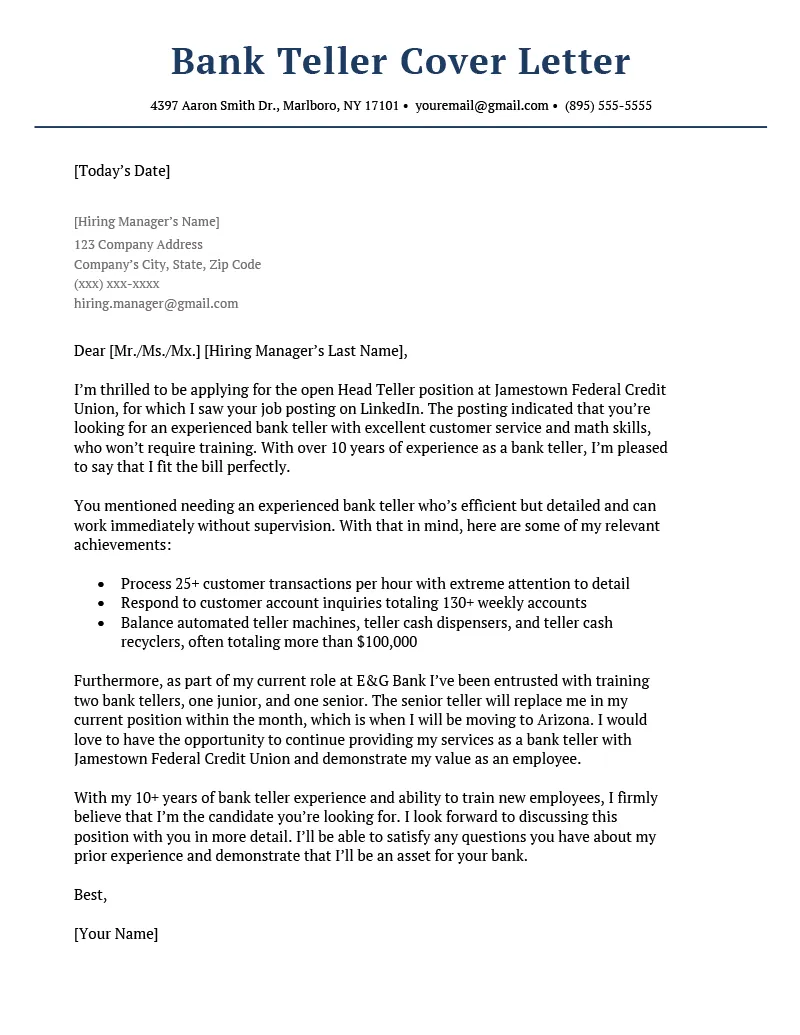
Customer service is paramount for a bank teller. Highlight your skills in this area by describing how you interact with customers, resolve issues, and provide excellent service. Showcase your ability to communicate clearly and professionally, listen attentively, and build rapport with customers. Provide examples of situations where you went above and beyond to assist a customer, such as resolving a complex issue, providing personalized service, or handling difficult situations with a positive attitude. If you’ve received any customer service awards or positive feedback, be sure to mention them. Emphasize your commitment to creating a positive customer experience, as this is a key factor in the success of any bank teller.
Attention to Detail
Accuracy is critical in banking. Highlight your ability to maintain a high level of accuracy in tasks such as handling cash, processing transactions, and balancing accounts. Provide examples of how you’ve demonstrated attention to detail in previous roles, such as successfully reconciling accounts or identifying and correcting errors. You might also mention any systems or procedures you’ve used to ensure accuracy, such as double-checking transactions or following a specific protocol for handling cash. Demonstrating your commitment to accuracy and your understanding of the importance of detail is vital for showing you’re capable of handling the responsibilities associated with a bank teller position. This will provide the hiring manager with assurance that you’re a reliable and trustworthy candidate.
Quantifiable Achievements
Use data to support your claims and demonstrate your impact. Include specific achievements that show your skills in action. For instance, if you improved customer satisfaction ratings, mention the percentage increase and the actions you took to achieve it. If you identified and corrected errors, quantify the amount of money saved or the number of discrepancies resolved. Use numbers to show your accomplishments and highlight your value to the bank. Quantifiable achievements make your cover letter more compelling and memorable. Be specific and concise, providing the hiring manager with clear evidence of your capabilities. This not only proves your ability to perform the tasks but also highlights your dedication and your impact on the organization, ultimately helping your application stand out from the competition.
Formatting Your Cover Letter
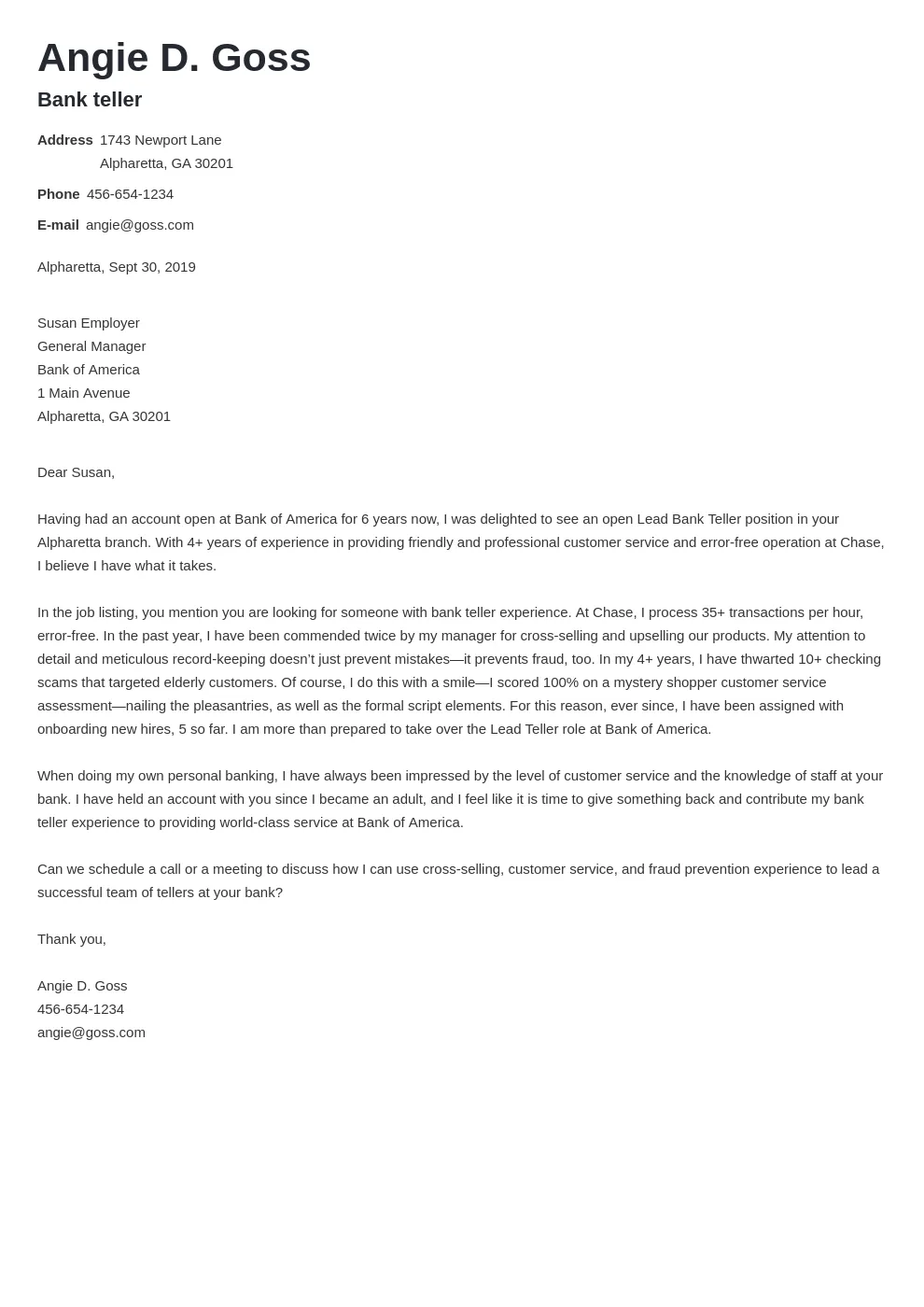
A well-formatted cover letter is essential for making a professional impression. Proper formatting makes your letter easy to read, highlighting key information at a glance. It shows attention to detail and an understanding of business communication standards, which are qualities valued in bank tellers. Here’s a guide to the key elements of a well-formatted cover letter, ensuring your application stands out in a positive way. A carefully formatted letter demonstrates professionalism and provides a polished presentation, helping to make a favorable first impression on the hiring manager.
Header and Contact Information
Begin with your contact information at the top left, including your name, address, phone number, and email address. Following this, include the date and the hiring manager’s name, title, and the bank’s address (if available). Make sure the contact information is accurate and up-to-date to ensure the hiring manager can easily contact you. Maintaining a clean and organized header provides a professional appearance, indicating that you pay attention to details. If you are applying online, ensure that your email address sounds professional. This initial section sets the tone for your entire cover letter, and a well-structured header reflects positively on your overall presentation.
Professional Greeting
Use a professional greeting such as ‘Dear Mr./Ms./Mx. [Last Name]’ if you know the hiring manager’s name. If you’re unsure, a general greeting such as ‘Dear Hiring Manager’ or ‘To Whom It May Concern’ is appropriate. Avoid overly casual greetings, such as ‘Hi’ or ‘Hello’. The greeting sets the tone for the rest of your letter and should be formal and respectful. It’s always best to address the letter to a specific person, which shows that you have taken the time to research the company and identify the appropriate contact. Using the correct greeting shows that you understand professional etiquette and have paid attention to details, further adding to your presentation and making a good first impression.
Opening Paragraph
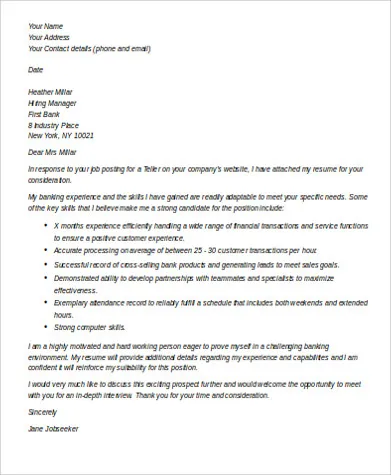
In the opening paragraph, state the position you are applying for and how you learned about the opening (e.g., job board, company website, referral). Briefly mention why you are interested in the position and the bank. This paragraph should capture the reader’s attention and set the stage for the rest of your cover letter. You may include a brief statement about your relevant experience and skills, but keep it concise. Your aim is to make the hiring manager want to read more. Your opening statement helps the hiring manager quickly understand why you are applying and allows you to show your enthusiasm for the position. Make sure your opening is compelling, concise, and engaging to capture the reader’s attention.
Body Paragraphs
The body paragraphs are where you highlight your strengths and skills. Each paragraph should focus on a specific skill or experience relevant to the bank teller position. Use the STAR method (Situation, Task, Action, Result) to provide concrete examples of your accomplishments. This method allows you to demonstrate how you handled different situations and achieved positive outcomes. Avoid simply listing your skills; instead, show how you applied them in previous roles. Use action verbs to start your sentences and keep your paragraphs concise and focused. By using the STAR method, you present your accomplishments in a structured, clear, and convincing way, which will impress the hiring manager and help them see your potential. This provides a clear demonstration of your suitability for the position and increases your chances of getting an interview.
Closing Paragraph
In the closing paragraph, express your interest in an interview and reiterate your enthusiasm for the position. Thank the hiring manager for their time and consideration. Provide your contact information again and mention your availability for an interview. Keep it brief and professional. Do not include any new information. Instead, use this section to reinforce your interest and make it easy for the hiring manager to take the next step. A well-written closing leaves a positive final impression and increases your chances of moving forward in the hiring process. This also signals your readiness and willingness to engage with the hiring process.
Proofreading and Editing
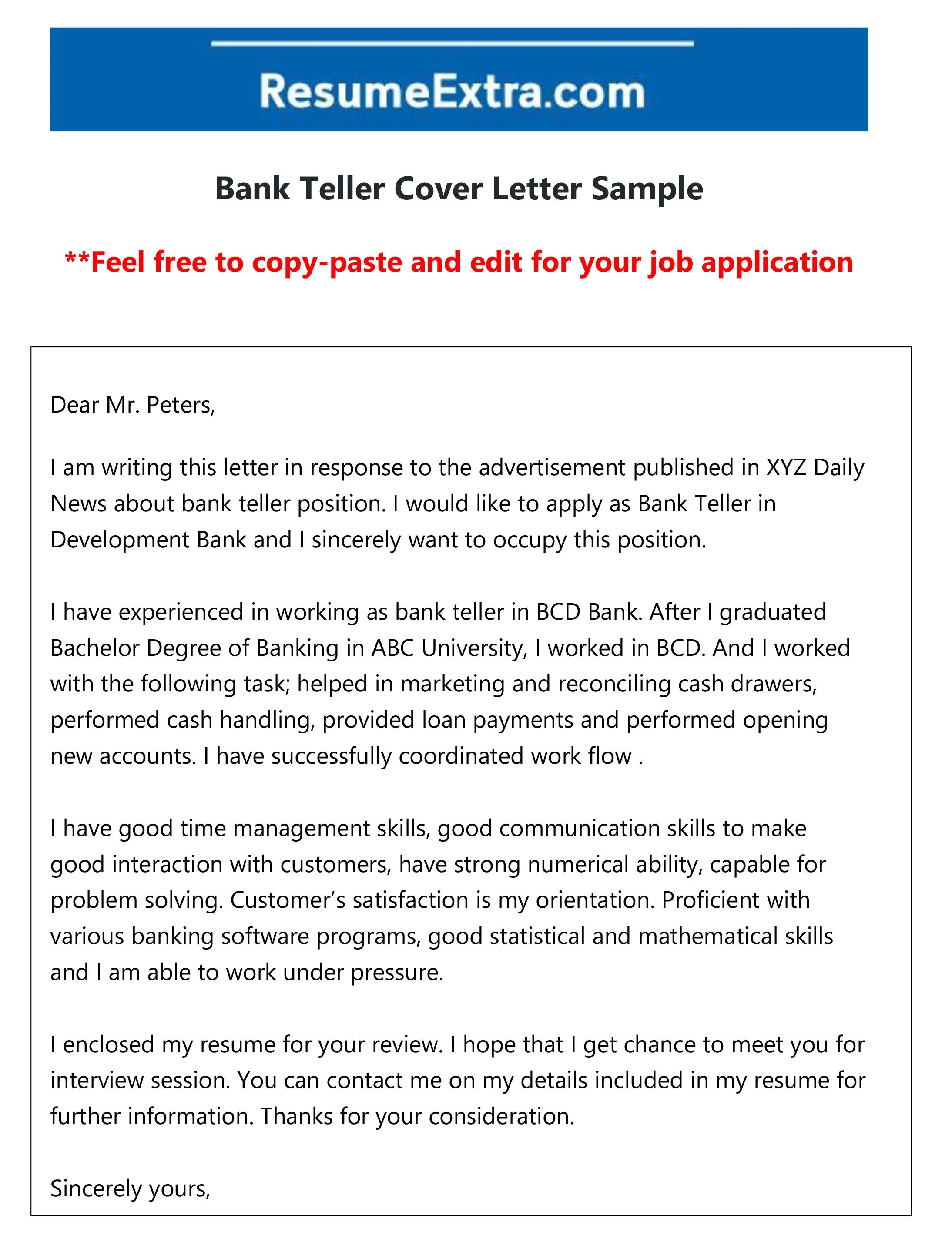
Proofreading and editing are essential to ensure your cover letter is free from errors. Carefully review your cover letter for grammar, spelling, and punctuation errors. Have a friend or family member read your cover letter to catch any mistakes you might have missed. Ensure the tone and language are professional and appropriate for a bank teller position. Errors can undermine your credibility and give the impression that you don’t pay attention to detail, an important quality in the financial industry. A cover letter with errors makes you appear less competent. Careful proofreading shows that you are meticulous and committed to presenting yourself professionally. This demonstrates your attention to detail and helps enhance your overall image to the hiring manager.
Tailoring Your Cover Letter
Tailoring your cover letter is essential to show the hiring manager that you are genuinely interested in the specific position and the bank. Customize your cover letter to each job application, as this shows that you have taken the time to understand the bank’s needs and are not simply sending out generic applications. This process demonstrates initiative and an understanding of the specific requirements of the job, which increases your likelihood of a positive response. Tailoring your cover letter to each application is a strategic approach that can significantly enhance your chances of success, and is a strong indicator of your enthusiasm and suitability for the role.
Researching the Bank
Research the bank to understand its mission, values, and services. This knowledge will help you align your cover letter with the bank’s goals and highlight how your skills and experience can contribute to their success. Visit the bank’s website, read news articles, and, if possible, learn about their culture and any recent initiatives. Demonstrating your understanding of the bank shows your interest in the position and your proactive approach to your job search. Mention specific aspects of the bank that resonate with you, and explain how your skills align with their objectives. Tailoring your cover letter in this manner will showcase your genuine interest in the position and set you apart from other applicants.
Matching Skills to Job Requirements
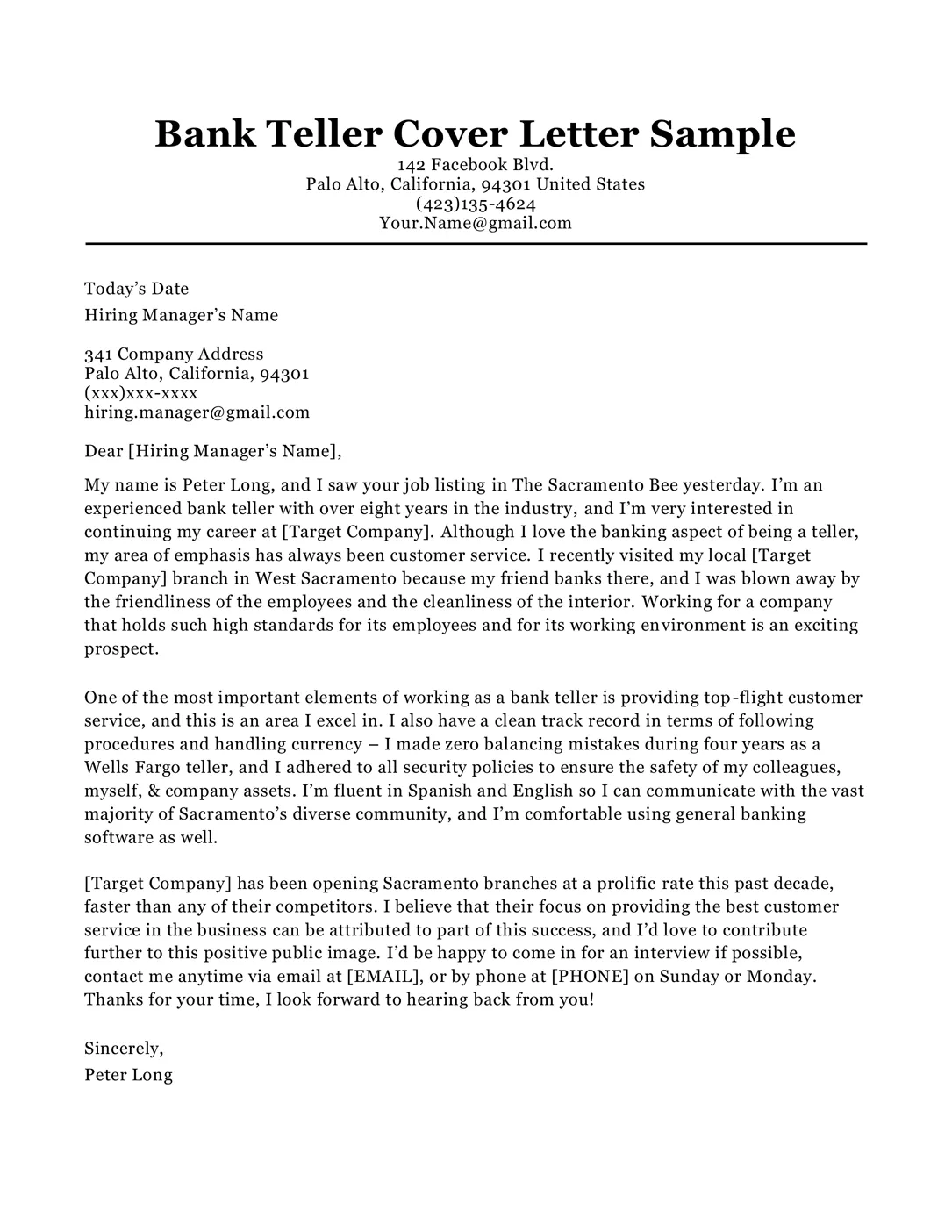
Carefully review the job description and identify the key skills and qualifications the bank is seeking. Then, match your skills and experiences to those requirements, providing specific examples of how you meet each of them. Use keywords from the job description to show you are a good fit and to ensure your application is easily noticed. This approach shows the hiring manager that you have taken the time to understand what the bank needs and that you have the required skills. It helps you clearly demonstrate that you are a good match for the role and can meet the employer’s expectations. This highlights the most relevant aspects of your experience and qualifications, therefore, increasing the likelihood of your application being noticed and considered.
Demonstrating Enthusiasm
Show your enthusiasm for the position and the bank throughout your cover letter. Express your interest in the bank’s mission, culture, and services. Use positive and energetic language to convey your excitement about the opportunity. Explain why you are excited about the role and the bank, highlighting the aspects that most appeal to you. Demonstrate that you are genuinely interested in the position, and not just looking for any job. This enthusiasm will make your application more engaging and memorable. Show the hiring manager that you are eager to join their team and contribute to their success. Enthusiasm can be a differentiating factor and can greatly increase your chances of getting the job.
